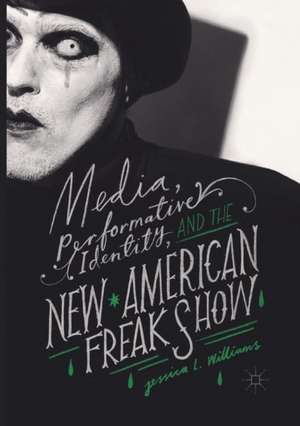Media, Performative Identity, and the New American Freak Show
Autor Jessica L. Williamsen Limba Engleză Paperback – 15 aug 2018
| Toate formatele și edițiile | Preț | Express |
|---|---|---|
| Paperback (1) | 518.63 lei 38-44 zile | |
| Springer International Publishing – 15 aug 2018 | 518.63 lei 38-44 zile | |
| Hardback (1) | 586.05 lei 6-8 săpt. | |
| Springer International Publishing – 18 oct 2017 | 586.05 lei 6-8 săpt. |
Preț: 518.63 lei
Preț vechi: 563.72 lei
-8% Nou
Puncte Express: 778
Preț estimativ în valută:
99.25€ • 102.53$ • 82.60£
99.25€ • 102.53$ • 82.60£
Carte tipărită la comandă
Livrare economică 21-27 martie
Preluare comenzi: 021 569.72.76
Specificații
ISBN-13: 9783319882505
ISBN-10: 3319882503
Pagini: 188
Ilustrații: XII, 188 p. 20 illus., 16 illus. in color.
Dimensiuni: 148 x 210 mm
Ediția:Softcover reprint of the original 1st ed. 2017
Editura: Springer International Publishing
Colecția Palgrave Macmillan
Locul publicării:Cham, Switzerland
ISBN-10: 3319882503
Pagini: 188
Ilustrații: XII, 188 p. 20 illus., 16 illus. in color.
Dimensiuni: 148 x 210 mm
Ediția:Softcover reprint of the original 1st ed. 2017
Editura: Springer International Publishing
Colecția Palgrave Macmillan
Locul publicării:Cham, Switzerland
Cuprins
1. Introduction.- 2. The Mediated Freak Body.- 3. Horror Movies, Horror Bodies: Blurring the Freak Body in Cinema.- 4. Reality, Normality, Sexuality: “Authentic” Portrayals of the Freak.- 5. Disability Pornography and the Cultural Politics of Disabled Sexuality.- 6. Born This Way?: Disseminating Identification.
Notă biografică
Jessica L. Williams is Visiting Assistant Professor of English at SUNY College at Old Westbury, USA.
Textul de pe ultima copertă
This book traces how the American freak show has re-emerged in new visual forms in the 21st century. It explores the ways in which moving image media transmits and contextualizes, reinterprets and appropriates the freak show model into a “new American freak show.” It investigates how new freak representations introduce narratives about sex, gender, and cultural perceptions of people with disabilities. The chapters examine such representations found in horror films, including a prolonged look at Freaks (1932) and The Texas Chainsaw Massacre (1974), documentaries such as Murderball (2005) and TLC’s Push Girls (2012-present), disability pornography including the pornographic documentary Sick: The Life and Death of Bob Flanagan Supermasochist (1997), and the music icons Marilyn Manson and Lady Gaga in their portrayals of disability and freakishness. Through this book we learn that the visual culture that has emerged takes the place of the traditional freak show but opens new channels of interpretation and identification through its use of mediated images as well as the altered freak-norm relationship that it has fostered. In its illumination of the relationship between normal and freakish bodies through different media, this book will appeal to students and academics interested in disability studies, gender studies, film theory, critical race theory and cultural studies.
Caracteristici
Explores the history of the freak show and how it was transformed through the emergence of media and explores the ways in which moving image media transmits and contextualizes, reinterprets, and appropriates the freak show model into a “new American freak show” Focuses on what changes in viewing mean, and why and how the viewer stares at freakish bodies through specific media including film, television, and live performance Examines such representations as found in horror films, including a prolonged look at Freaks (1932) and The Texas Chainsaw Massacre (1974), documentaries such as Murderball (2005) and TLC’s Push Girls (2012-2013), disability pornography including the pornographic documentary Sick: The Life and Death of Bob Flanagan Supermasochist (1997), and the music icons Marilyn Manson and Lady Gaga in their portrayals of disability and freakishness Includes supplementary material: sn.pub/extras
